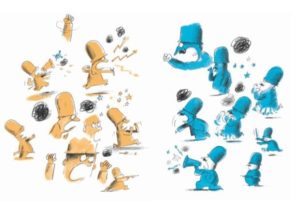Why so angry?
October 23, 2019A Course in Miracles
T-30.VI.1. Anger is never justified. 2 Attack has no foundation. 3 It is here escape from fear begins, and will be made complete. 4 Here is the real world given in exchange for dreams of terror. 5 For it is on this forgiveness rests, and is but natural. 6 You are not asked to offer pardon where attack is due, and would be justified. 7 For that would mean that you forgive a sin by overlooking what is really there. 8 This is not pardon. 9 For it would assume that, by responding in a way which is not justified, your pardon will become the answer to attack that has been made. 10 And thus is pardon inappropriate, by being granted where it is not due.
“Anger continued on past its usefulness becomes unjust, then dangerous… It fuels not positive activism but regression… self-righteousness. Corrosive, it feeds off itself, destroying its host in the process.” -Ursula K. Le Guin
Maria Popova:
Le Guin begins with a case study in the cultural history of anger as a tool of social change — epoch-making change she lived through and helped engender:
In the consciousness-raising days of the second wave of feminism, we made a big deal out of anger, the anger of women. We praised it and cultivated it as a virtue. We learned to boast of being angry, to swagger our rage, to play the Fury.
We were right to do so. We were telling women who believed they should patiently endure insults, injuries, and abuse that they had every reason to be angry. We were rousing people to feel and see injustice, the methodical mistreatment to which women were subjected, the almost universal disrespect of the human rights of women, and to resent and refuse it for themselves and for others. Indignation, forcibly expressed, is an appropriate response to injustice. Indignation draws strength from outrage, and outrage draws strength from rage. There is a time for anger, and that was such a time.
Anger is a useful, perhaps indispensable tool in motivating resistance to injustice. But I think it is a weapon — a tool useful only in combat and self-defense.
Le Guin considers how the uses of anger can metastasize into misuses when its aims are left uncalibrated under the ferment of time:
Anger points powerfully to the denial of rights, but the exercise of rights can’t live and thrive on anger. It lives and thrives on the dogged pursuit of justice.
[…]
Anger continued on past its usefulness becomes unjust, then dangerous. Nursed for its own sake, valued as an end in itself, it loses its goal. It fuels not positive activism but regression, obsession, vengeance, self-righteousness. Corrosive, it feeds off itself, destroying its host in the process.
A century and a half after Walt Whitman admonished that “America, if eligible at all to downfall and ruin, is eligible within herself, not without,” Le Guin adds:
The racism, misogyny, and counter-rationality of the reactionary right in American politics for the last several years is a frightening exhibition of the destructive force of anger deliberately nourished by hate, encouraged to rule thought, invited to control behavior. I hope our republic survives this orgy of self-indulgent rage.
https://www.brainpickings.org/2017/12/05/ursula-k-le-guin-no-time-to-spare-anger/
